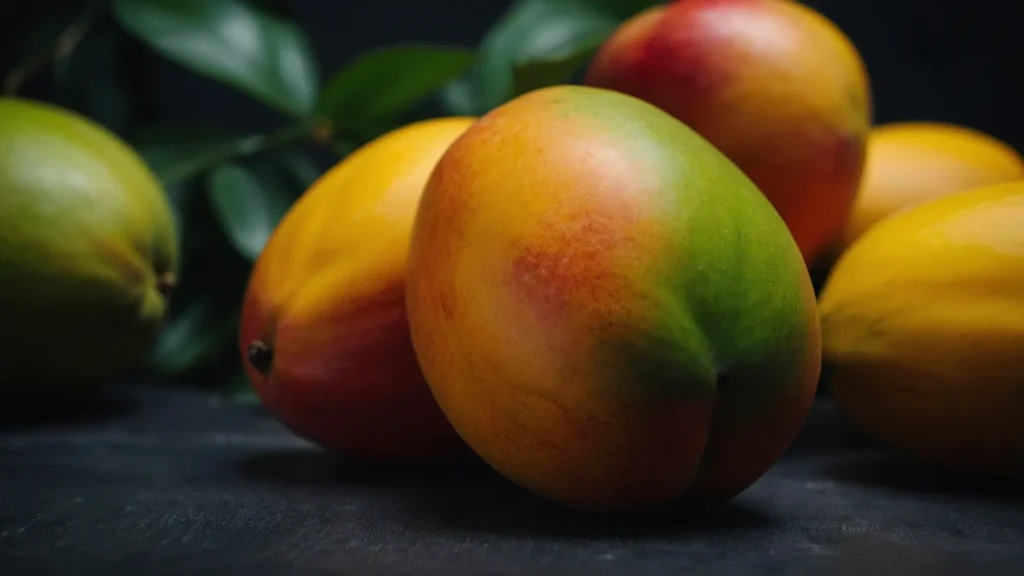Can Dogs Eat Mango?

As dog owners, we often find ourselves sharing our lives and, inadvertently, our snacks with our furry companions. Among the myriad of fruits that catch our attention, mango stands out for its sweet, succulent taste and nutritional benefits. However, the question of “Can Dogs Eat Mango?” and whether dogs can safely enjoy mango, just as we do, is a topic of considerable interest. This guide aims to explore the compatibility of mango with a dog’s dietary needs, shedding light on the benefits and potential risks associated with feeding this tropical fruit to our canine friends. Furthermore, we will delve into the safety of other common fruits like grapes, cherries, and blueberries for dogs, providing a comprehensive overview for pet owners looking to diversify their dog’s diet with fruit options. Join us as we navigate through the nuances of incorporating fruits into a dog’s diet, ensuring the well-being and happiness of our beloved pets.
Is Mango Good for Dogs?
Mango is not just a delicious fruit for humans; it also offers a range of benefits for dogs when introduced to their diet in moderation. Rich in vitamins A, B6, C, and E, mangoes provide essential nutrients that can help support a dog’s immune system, improve skin and coat health, and promote overall well-being. The dietary fibers in mangoes can aid in digestion, while the antioxidants help combat free radicals, reducing the risk of chronic diseases.
However, the introduction of mango to a dog’s diet should be done cautiously. The fruit should be peeled, and the pit removed to prevent any choking hazard or intestinal blockage. The pit contains small amounts of cyanide, which is harmful to dogs. Moreover, the high sugar content in mangoes, while a source of instant energy, necessitates moderation to avoid weight gain and to maintain optimal health. In essence, when served in small, controlled portions, mango can be a healthy and enjoyable treat for dogs, contributing to a balanced and nutritious diet.
Is Mango Bad for Dogs?
While mangoes offer nutritional benefits to dogs, there are certain risks associated with feeding them this fruit. The primary concern lies in the mango pit, which poses a significant choking hazard and can lead to intestinal obstruction if ingested. The pit also contains cyanide, a toxic substance that, although present in trace amounts, can be harmful if consumed in large quantities.

Another potential downside is the high sugar content in mangoes. Dogs consuming too much sugar can face health issues such as obesity, dental problems, and even diabetes over time. Therefore, moderation is key when including mango in a dog’s diet. Additionally, some dogs may exhibit allergic reactions to mango. Symptoms can include itching, swelling, and digestive upset. It’s crucial to introduce mango (or any new food) gradually and to monitor your dog for any adverse reactions.
In summary, while mango can be a nutritious treat for dogs, it’s essential to consider the potential risks. Proper preparation by removing the pit and moderation in serving sizes can mitigate these risks, ensuring that mango remains a safe and enjoyable treat for your pet.
Are Other Fruits Safe For Dogs?
When it comes to feeding dogs fruits other than mangoes, it’s important to know which are safe and which could be harmful. Grapes and cherries, for instance, are fruits that dog owners should avoid giving to their pets. Grapes and raisins have been linked to acute kidney failure in dogs, with even small amounts causing toxic effects. Similarly, cherries contain cyanide in their pits, stems, and leaves, posing a risk of toxicity if ingested, along with a potential choking hazard.
On the other hand, blueberries are a safe and healthy choice for dogs. They are low in calories and high in antioxidants, vitamins C and K, and fiber, making them an excellent treat for supporting a dog’s immune system and overall health. Blueberries also have anti-inflammatory properties, which can benefit older dogs suffering from joint issues. As with any treat, they should be given in moderation to prevent gastrointestinal upset.
Incorporating fruits into a dog’s diet can provide variety and nutritional benefits, but it’s crucial to research and understand which fruits are safe and how to properly prepare them for your pet.
Final Thoughts
Feeding your dog mango and other fruits can be a wonderful way to supplement their diet with essential vitamins and minerals. Mango, in particular, can offer numerous health benefits when prepared properly and served in moderation. However, as responsible pet owners, it’s vital to be aware of the potential risks associated with certain fruits, including mangoes, and to always prioritize the safety and well-being of our furry companions.
In conclusion, while many fruits are safe and beneficial for dogs, including mango and blueberries, others like grapes and cherries should be strictly avoided. Always introduce new foods gradually and monitor your dog for any signs of adverse reactions. By doing so, you can enjoy the journey of exploring new tastes and textures with your dog, ensuring they lead a healthy, happy, and flavorful life.










